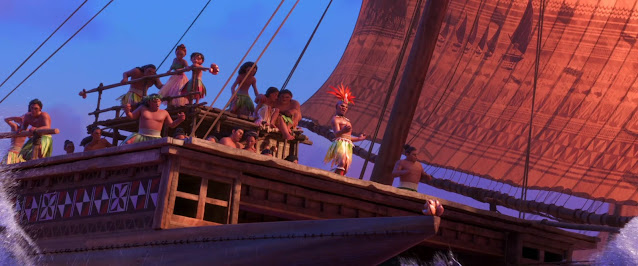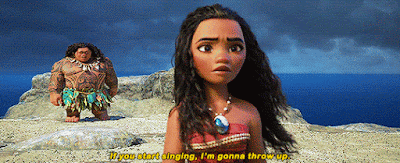Moana (Ron Clements, John Musker, Don Hall, Chris Williams, 2016) I missed this in the theater, and I will regret that until I have the opportunity to rectify it (which is certainly on my list of things to do). Given the evidence on the inadequate video screen on which I saw this, Moana deserves, even begs, to be seen as big as it can in order to truly appreciate the beauty of the thing and to wonder at the details of it and to be whacked upside the eyeballs with its color palette.
Why the reluctance? I'd say "Frozen burn-out" (a variation of "Freezer Burn") even though I truly enjoyed that movie and thought it did a lot of good in rectifying some inherent issues with the fabled "Princess Movie." "Been there/Done That/Let it Go." Bad mistake. Because Moana does a lot of interesting story-telling things (like bridging the gap between fairy-tale, folk-tale and myth) and expanding the magical realm to take on broader themes than just personal satisfaction—all those "I Want" songs!—and taking up the theme of stewardship and responsibility. This is Disney (under John Lasseter's mentorship), but cousin Pixar Studios was putting its toe into that same ocean with its short, "Lava," released in 2014.
One may assume they were checking each other's work. Moana challenges and occasionally tops the photo-realism that was being attempted in "Lava," but pops with more detail and texture. One can argue the efficacy of making everything picture-postcard-perfect,* but one can't be anything but amazed at such imagery in motion. CGI can make magic realistic, but it very rarely makes it the visual poetry that Moana accomplishes.The story starts a bit traditionally mixing the "Princess" mythology with "The Hero's Quest." We get a preamble of "what went wrong" when the shape-shifting (and vain-glorious) demi-god Maui (voiced eventually by Dwayne "The Rock" Johnson) sought to possess the pounumo stone, the heart of the mother island Te Fiti, with which she could create life from the oceans. Attaining the stone, Te Fiti collapses and Maui is attacked by the volcano-demon Te-Ka, who knocks him out of the sky, breaking his magical fish-hook and sending the stone into the depths of the sea. Legend has it that powerful forces still search for the stone that might still restore Te Fiti before the dark times befall the islands, unless a chosen warrior can find the heart, and travel past the island's reef, and convince Maui to restore the stone to its rightful place.
Cue Moana, who, if we're to believe the opening has been chosen by the sea to be that warrior, even if her parents, Chief Tui (Temuera Morrison) and Sina (Nicole Scherzinger), choose to ignore the signs and insist the their daughter stay at home and learn how to be the next chief. They're also ignoring the signs of blight on the island, ruining the crops and shrinking the fish-catches. Moana's already thinking ahead, arguing with her father to take their nets beyond the reef, and is determined to show him she's right by taking a skiff out herself, only to to be scuttled, her boat destroyed and her nearly drowning in the attempt. Her parents forbid her from ever taking another boat out into the ocean again. What's the Ma'ori word for "grounded?"
But, Moana's grandmother Tala (the amazing Rachel House) doesn't discourage her. She tells Moana the story of Maui and Te Fiti and leads her to a cave that houses the boats that originally brought her people to the island and how the demi-god's actions caused the oceans to turn against her people and never again leave the island. She gives her the "heart" stone and points to a hook in the stars, telling Moana to follow them to find Maui. Moana goes back to the cavern and takes one of the boats and heads out to sea to accomplish the task of saving the island and her people.
After a terrifying journey, guided by the spirit of her grandmother, Moana's craft capsizes in a storm and she and the craft are washed ashore on the island. But, hook drawings on the rocks assure her that she has actually reached the island where Maui, having lost the hook that allows him to shape-shift, has been stranded for a thousand years. Maui, understandably, is glad to see her—she has a boat; he can get off the island. Moana tells her of her plan but he won't have any of it; he's a demi-god, after all, and he's used to doing what he wants to do, and not taking orders from natives. Praying to him might help, but being out of activity for so long he's more than likely to ignore her.
Much bickering, much attitude. Moana thinks he's a jerk; he thinks she's ungrateful. Finally, he just takes her boat and leaves her stuck in a cave while he sails off. But, he's just a demi-god, and Moana has a powerful ally in the ocean, which is only too happy to deposit Moana back on the boat no matter how hard Maui can throw her off of it. He tries to throw the heart away. The ocean throws it back. He jumps overboard and starts swimming. Not for long before he's thrown back onto the boat. He's fighting a losing battle and he, understandably, does want to take on another one, liking returning the heart back to its source and confronting Ta Ka.
Despite it being a Disney movie, the course of those never run smoothly, and, besides the two sailors wanting to go in different directions, they have to deal with Kakamora pirates, regaining Maui's hook from a monster crustacean named Tamatoa (Jemaine Clement), and then, and only then, with Maui's powers intact, maybe taking on Te Ka, so that Moana can return the heart to Te Fiti—if it were only that easy. Oh, yeah, and there's a crazy chicken that keeps getting in the way. What would a Disney princess by without a "familiar?"
The songs are less traditional, more snappy with more patter, more rhythm and less melody, as they're crafted by Lin-Manuel Miranda, and, although the film is free of Broadway/Vegas showstoppers, they bounce along, don't outwear their welcome, and never impede the narrative. The animation department also compensates by ramping up the speed during those moments. The film never drags, although there are times the visuals are so gorgeous that you want to hang just a little bit longer.
It's also a solid story, combining folklore, anthropology, sociology, ecology, and fairy tale and myth. Tall order for a cartoon. Everything is hitting all cylinders and a joke never falls flat. Nor did the animation skimp on the scenery for the characters and vice versa. Vistas are photo-realistic (or better), and the expressions are rubbery and recognizable as human beings'.
It all works amazingly well, enchanting entertainment for young and old alike. It's just that I wish I could have seen it on a big screen where all the amazing handiwork could be appreciated in all its glory. We'll make it a life-goal.
*






















No comments:
Post a Comment